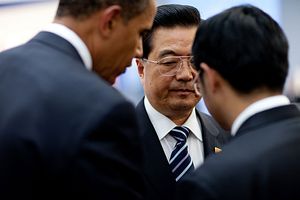Mid-October during the 19th Party Congress in Beijing was all about Xi Jinping. It was a bit like one of those sweets that you can buy in British seaside resorts with the name of the place written throughout, no matter where you cut it. Xi was in the Constitution, on the stage, at the Guizhou meeting, and on every front page. The Party Congress ended up being a festival of Xi.
The only interloper to this, briefly but magnificently, was Jiang Zeming, Xi’s predecessor but one as Party secretary. While Xi spoke for almost three-and-a-half hours on the first day, Jiang’s sideshow was a masterclass in a delicate statement of dissent through boredom. But from Xi’s immediate predecessor, Hu Jintao, sitting on his other side, there was complete stillness and the lack of any discernible expression — characteristics the world came to know and love during Hu’s 10 years in power from 2002 to 2012.
Hu is becoming reminiscent of a figure who was overwhelmed by other more dominating histories from a few decades back – Hua Guofeng. Despite being Mao Zedong’s final chosen successor, Hua simply got shuffled aside and then forgotten during the great Deng Xiaoping comeback after 1978. As scholars Frederick Teiwes and Warren Sun have shown, Hua’s active support of the reform process was a major contribution to its final success. But he was to spend the years after 1982 largely languishing in retirement, and appearing at the odd grand occasion — the last around the time of the Olympics, when he amazed the few that remembered him and who had assumed he had been long dead.
In a hotel room at one of the Party institutions in September this year, I was intrigued to see the three volume collected works of Hu Jintao placed on the bookshelf. Symbolically, their plain, unexciting covers were sandwiched between much bolder, redder, visible fare about Xi Jinping. That seems to be Hu’s fate. Like Hua, Hu is historically situated between two much more vocal, powerful personalities, and doomed to slide into the great amnesia that is much of history.
Hu should not be allowed t0float away so easily, however. There are two very powerful reasons why, despite all the constant claims about his lack of power and influence even when he occupied the top slot, Hu made massive contributions to the Party, and why Xi should be profoundly grateful for him.
Let’s remember who presided over the most phenomenal and sustained period of economic growth in China’s modern history. From China’s entry to the World Trade Organisation, just before Hu was elevated to the top slot in 2002, to the day he left in November 2012, the Chinese economy quadrupled in size. It did this despite a number of serious crises, from the impact of SARS in 2003 to the global financial crisis from 2008. In fact, it was during this period that China, despite seeing its overseas export markets contract, entered an era in which it posted ten percent plus annual growth. By the end of Hu’s period at the helm, Chinese people were tangibly wealthier, and the country was physically different because of its wealth, with more high speed rail, more skyscrapers, more cars, and more housing than ever before. Hu’s government was more successful at pumping out raw growth than any other at the time, and probably before. It is hard to think of a larger, more sustained, more successful project to enrich a country.
Without this economic legacy, Xi’s plans for national rejuvenation and a China Dream would be at best speculative, and at worst fantasies. Xi’s grand plans are built on the phenomenal gift that Hu gave him – a massive, dynamic economy and epic accumulations of wealth. Without this, China’s global and domestic plans under Xi would be impossible. The wealth Hu did so much to create is the basis of Xi’s current power.
But beyond this, Hu, with his egoless, almost anonymous and faceless leadership, served the institutionalization of the Party well. He observed the rules of succession with fierce accuracy. He went when he was meant to go, and has done nothing to involve himself in politics since then. He has given his successor complete liberty, unlike Jiang, who interfered and meddled in Hu’s business from 2002 with almost pathological persistence. Hu was truly a servant of the Party as a corporate entity, making sure there was a clear precedent for sticking to the rules, rather than claiming an individual could transcend them.
We don’t know if, in five years time, Xi will decide to break some of these precedents and stay on. We do know, however, after this Congress that the rules so far have stood. No one in the new Standing Committee is over retirement age. There were no unorthodox moves, apart from having no clear successor in the line up. Hu’s punctilious observance of Party procedure might well turn out to be a massive issue in a few years hence, when decisions about the 20th Party Congress are being made.
None of this will probably matter to Hu himself. He was reportedly a highly diffident, almost academic figure as a person, who sat somewhat oddly in the immense paraphernalia of power in modern China. But to those who attend to the longer sweep of history, Hu may well be judged a much more significant figure than he currently is. And while Jiang stole the show with his theatrical impatience in mid-October, and Xi dominated with his ubiquitous control, it was Hu — sitting quietly and calmly — who may well up winning the biggest accolades when the history books get written, years hence.

































